by Brian Hioe
語言:
English /// 中文
Photo credit: 蕭新晟 港湖科技代議士/Facebook
Translator: Brian Hioe
On September 18th, New Bloom editor Brian Hioe interviewed Hsiao Hsin-cheng of the New Power Party, who is running in the Nangang-Neihu area of Taipei. This is part of New Bloom’s ongoing series of interviews with independent city councilor candidates, as part of its special 2018 election coverage.
Brian Hioe: The first question I want to ask is, could you introduce yourself for readers that don’t know you?
Hsiao Hsin-cheng: I was an exchange student from when I was small. I was born in Tainan and then moved to Shetou in Changhua. In kindergarten, I moved to Taipei, so I grew up in Taipei. In high school, I went to America, and so I went to high school and college in California. I came to Long Island in New York City for a PhD in physics. I spent five years studying for my PhD, but I left before I finished the degree and then was just living in New York City. I began to work on start-ups because I had learned engineering and programming on my own. I had already known how to program while I was in school because of my physics degree. So after I left school, I taught myself how to program in New York City, and began to make software and etc. In the end I came back to Taiwan.
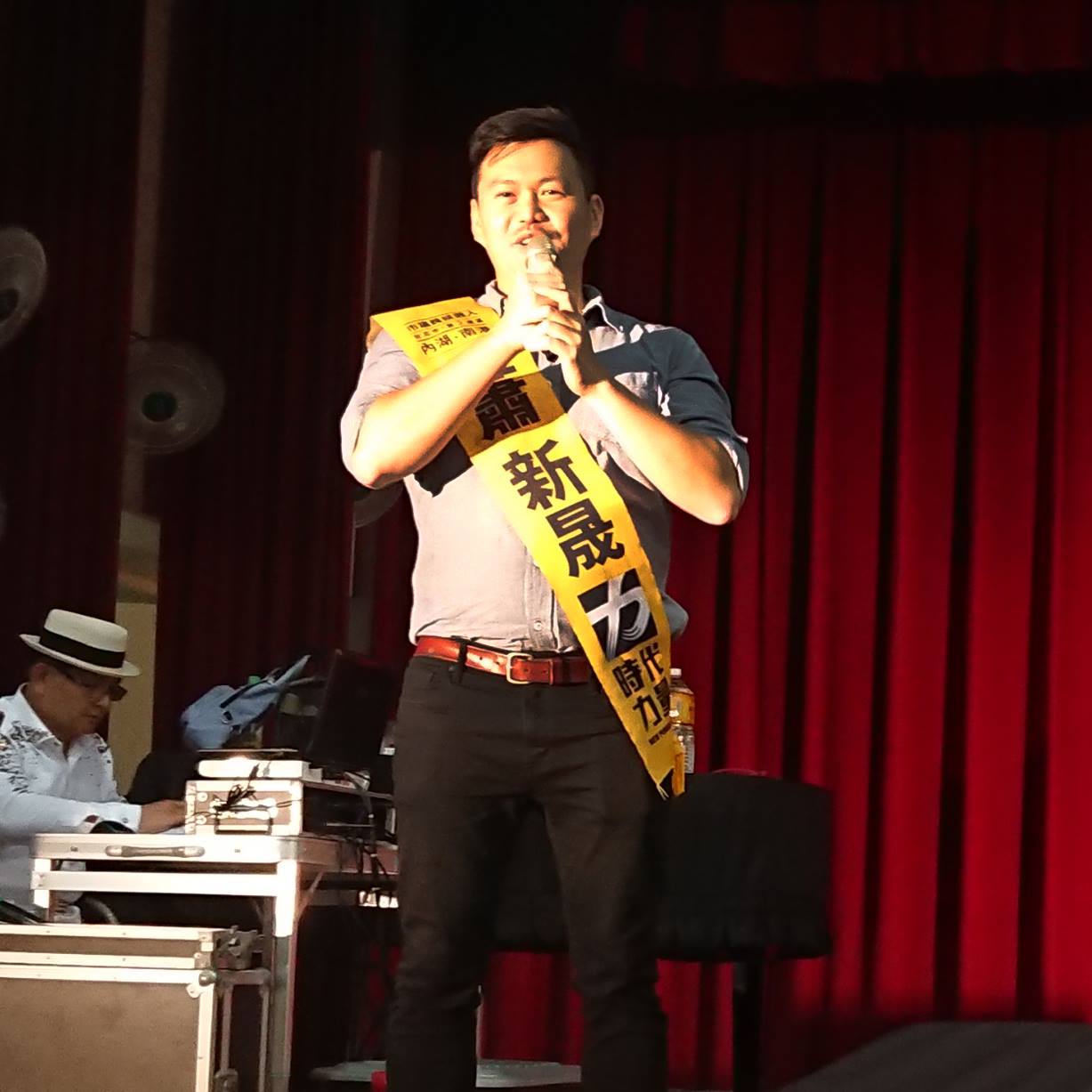 Photo credit: 蕭新晟 港湖科技代議士/Facebook
Photo credit: 蕭新晟 港湖科技代議士/Facebook
BH: How did you begin to participate in social movements? Such as with Cafe Philo in New York City.
HH: Like most other Taiwanese, I became to participate more actively after the Sunflower Movement. After I moved to New York, I encountered more Taiwanese organizations and more Taiwanese overseas students groups, as well as more pro-Taiwan elders. This led to a renewed sense of Taiwanese identity for me, which previously wasn’t as strong. It was after the Sunflower Movement that I had a so-called “awakening” and I began to participate in these activities. The first of these was Philosophy Fridays in New York, because I knew Alyssa Chiu and Edward Yan-Ting Liu. After I got to know these people, I found out that Cafe Philo needed a space for activities, and because I was involved in a start-up, I had an office space to offer, so that’s basically how we began.
BH: How did you come back to Taiwan, to participate in elections as a candidate of the New Power Party?
HH: So I helped run Philosophy Fridays, and in the end, because of these friends I knew, I went to Washington DC for g0v’s first hackathon in 2014. I felt very interested in this because this was an activity to change society through engineering, so I brought the idea to New York and held a hackathon there in 2016. Because of this, we later launched the Taiwan National Treasure initiative, among other projects, and in the end, it got into the national press—It was the front page article in the Liberty Times on July 11th. Through all of this, I got to know these people from different backgrounds, including from political circles, plus politicians from Taiwan visiting New York.
In one of these instances, I met Freddy Lim. I wasn’t very well acquainted with him then, but our social circles overlapped. There was one time that, because while we were in DC tending to some responsibilities for the National Treasure project, it just so happened that a group of people from the New Power Party were attending the Taiwanese American Conference-East Coast at the same time, so they went with us to DC to scan documents. So we became more and more well acquainted. Wu Cheng and Lin Yin-meng were part of that group. So afterwards, it felt more and more like we were all people that could really get along. And in the end, Freddy Lim called up one day to ask if I would be willing to represent the New Power Party in Neihu and Nangang. So through this series of considerations, I came to feel that it wasn’t a bad idea. That maybe we could give it a try [Laughs]. Yeah, that’s what happened.
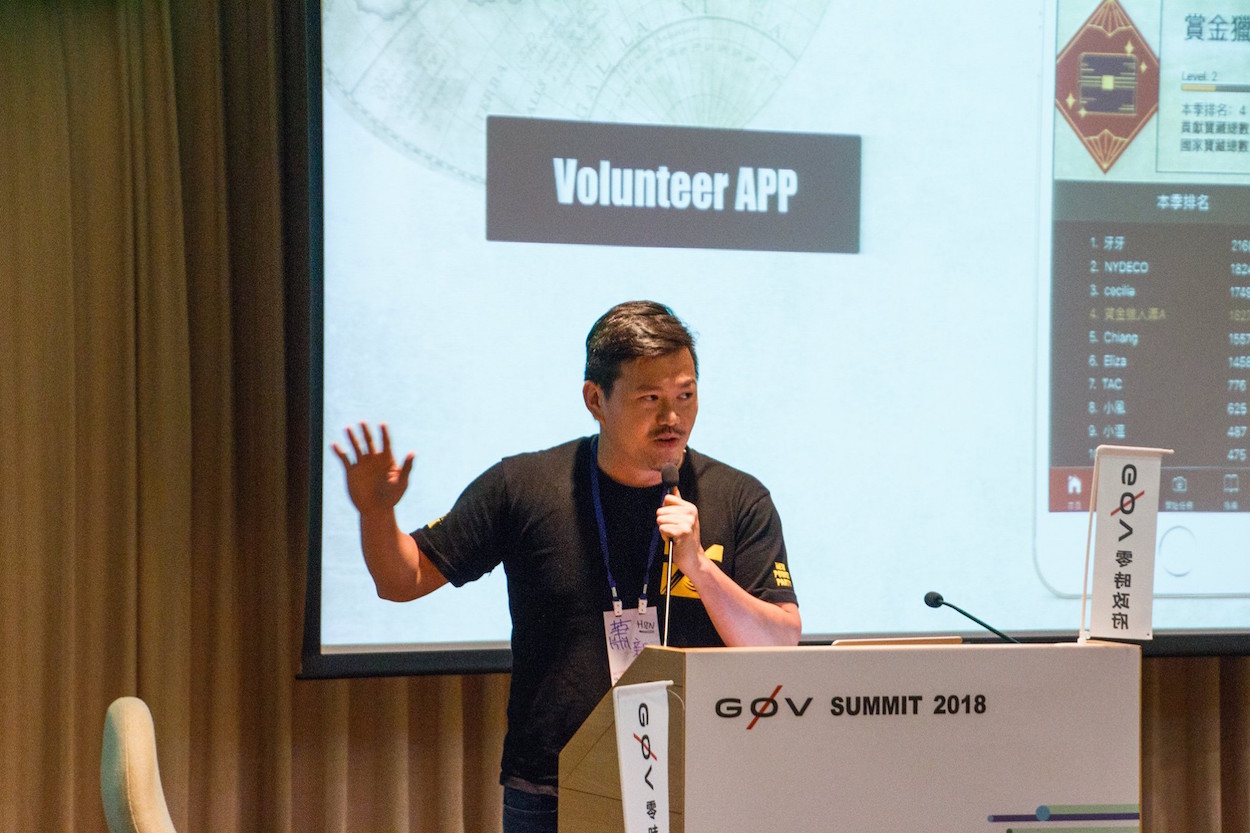 Photo credit: 蕭新晟 港湖科技代議士/Facebook
Photo credit: 蕭新晟 港湖科技代議士/Facebook
BH: As a candidate of the New Power Party, what kind of values do you think the New Power Party represents?
HH: The values of the New Power Party are the same as those of this young generation of Taiwanese. We value labor rights, because Taiwanese young people frequently confront long working hours and work overtime, for which they are not paid, and their so-called suitable working conditions are actually very challenging and harsh. The New Power Party has spent a great deal of energy supporting workers and young people. Outside of this, there is also LGBTQ rights, marriage equality, environmental issues, etc., as well as the ‘normalization’ of the country. For me, the New Power Party is the kind of political party that Taiwan should have always had but hasn’t. So I believe that this party is necessary for Taiwan—particularly for this generation—and I hope we don’t see it disappear. Thus, I was willing to pitch in to help the party grow.
BH: What is particular about your district? Who are you competing with and how do you hope to compete?
HH: Compared to other electoral districts, this area is more peaceful. We have fifteen candidates fighting for nine seats. It’s less intense compared to other electoral districts. Out of the five NPP candidates of Taipei, I am the oldest. I’m thirty-five years old. But in this district, I am the youngest. For example, in Wenshan, Lin Yin-meng is quite young, but there are people running in her district who are 27 or 28 years old. But in this district, I can say I am the youngest. In some ways, this district is more resistant to change. These current city councilors have held onto their seats for more than eight years.
Each one has served over eight years, including Gao Jia-yu. Although she is 38, she has been in power for eight years. So they are all old faces. So when I campaign, many people tell me that, yes, we should let young people give it a shot, that we should give younger people a chancet. So I have a feeling that people are anxious for change. I have this kind of feeling when campaigning. So this is also my campaign message, that we should allow young people, allow new people, and different people, like software engineers to give it a shot. So this is my strategy.
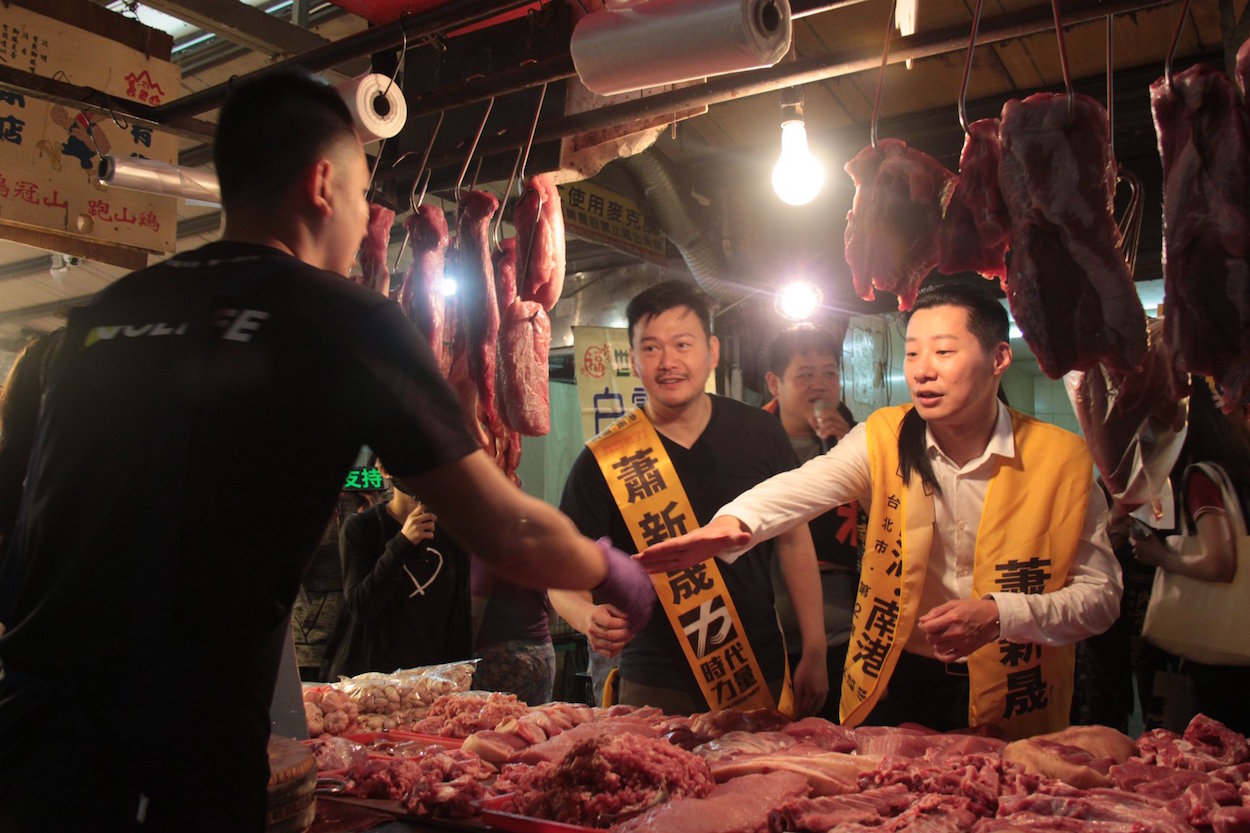 Photo credit: 蕭新晟 港湖科技代議士/臉書
Photo credit: 蕭新晟 港湖科技代議士/臉書
BH: What is different about you and other candidates, in that case?
HH: I am very different from other candidates. It may be that in Taiwanese history, there hasn’t been anyone else who went from software engineer to a political candidate. As a result, from the get-go, there’s something I can do that other people can’t. For example, in terms of phone canvassing, other people may have to invite an outside software engineer to help then, which may be expensive, and even still, there might be some inside data that they can’t access because there is a middleman. But I can design my own program. So when I make a phone call to the 330,000 voters of this district, I have control over every single detail. Which is to say, as a software engineer, there are some things that I can do, and I can bring in new waves of thinking, with many different campaign strategies. I also am the first political candidate in Taiwanese election history to take bitcoin donations.
Although I don’t get much in donations, this is a new way of thinking, to use cryptocurrency for campaign donations. Compared to regular donations, so long as you know my digital wallet, you can see how much money I have received, when it was sent, and who sent it to me. These things can all be checked. It’s a built-in transparent way of getting campaign donations. So this is quite interesting. However, on the flipside, many candidates have things that I do not. For example, some of them are lawyers and they can speak in a very influential way. I may be more soft-spoken, or maybe more shy. Sometimes these are shortcomings, but I’m pushing for a different kind of candidate, and I hope to allow voters to decide if Neihu and Nangang need a different kind of candidate.
BH: So you think that the challenge you mainly have to overcome is that you are different from other politicians?
HH: Yes, I am not the same as other politicians, so on the one hand, of course, I have to convince my voters that a different politician is suitable. On the other hand, I also have to do my best to be like a more traditional politician in some ways, too.
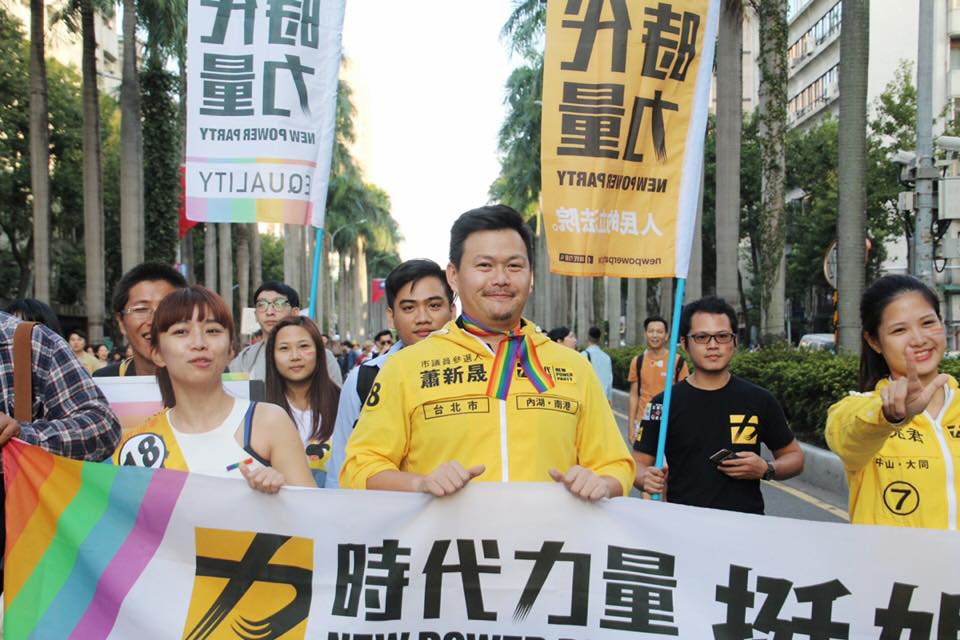 Photo credit: 蕭新晟 港湖科技代議士/Facebook
Photo credit: 蕭新晟 港湖科技代議士/Facebook
BH: How would you situate Taiwan’s Third Force in other political developments across the world? Such as the emergence of the Democratic Socialists of America in the United States, or of third parties in other parts of the world?
HH: Taiwan is rather unique in this aspect—for a true third force to emerge, not a party or faction subordinate to another. And, it was born out of the SunflowerMmovement. So it’s something precious for young people—including myself—and because of this, whether it’s as a party or this movement, or whatever is left of the Sunflower Movement, we should let it carry on.
But what’s interesting about the third force is that, while there are many third forces across the world, that is to say, third parties, they often live on the fringe. So they always get 10% or 15% and they live there, they don’t want to expand or do anything else. Because they maybe take the extreme side on some issues. I don’t think the NPP is like that. We are trying to grow as big as possible and we want to overtake the KMT to become the second largest political party in Taiwan. And we’re going to compete side by side with the DPP on a host of issues. We hope for political debates to become progressive versus conservative and not anymore about independence versus unification.
Because I think that for a country to debate about independence versus unification is without meaning. For a country to be always debating whether to become part of another country, this shouldn’t be, it never should happen on the political discourse, right?Whether we should spend our resources on public housing for the young or long-term care for the elderly, these are the kind of issues or ideology that we should be debating and voting on. what is that we hope for— for the NPP to become large enough to challenge the DPP separately and to do what this generation hopes to accomplish.
BH: What do you think is different about 2018 elections as compared to 2016 elections? It’s been two years.
HH: We are building on what we have, what we’ve established in 2016. This is to allow to us to take another step into politics, to allow the NPP to establish itself in different bodies, and become stronger, closer to the people’s will, and closer to our voters. And to allow our comrades in the party to more firmly establish their values. We’re on a good course.
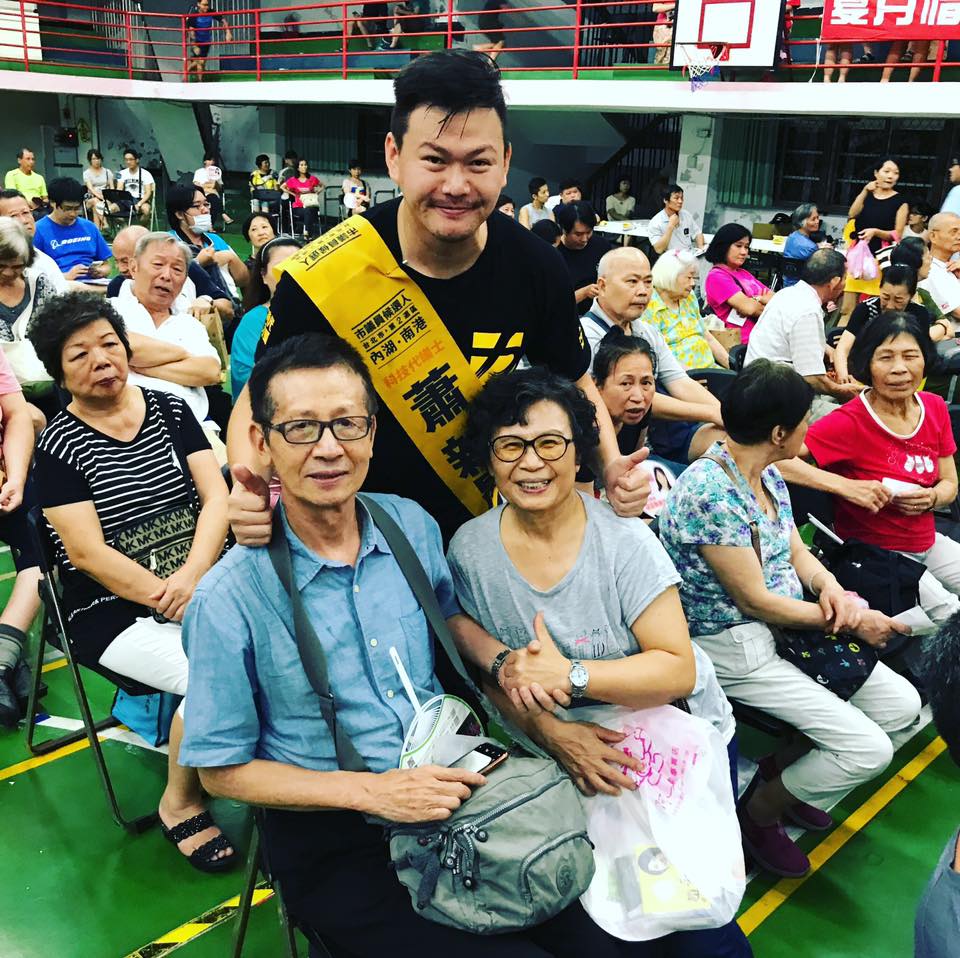 Photo credit: 蕭新晟 港湖科技代議士/Facebook
Photo credit: 蕭新晟 港湖科技代議士/Facebook
BH: Lastly, what would you have to say to not only Taiwanese voters, but international ones?
HH: I would actually like to say something to Taiwanese who live internationally, that is, my old self. Which is to say that Taiwan continues to progress towards becoming a better place. When you left Taiwan, that Taiwan is no longer Taiwan today. The Taiwan of three to five years from now may also not be the Taiwan or today. So if you’re outside of Taiwan and you’re feeling like you’ve hit a wall or are pondering whether it’s time to go home, maybe going home is the right answer.
Pitch in and help out. This society needs more people who have spent time outside of Taiwan, whether that’s in terms of skills, or mindset, or ideology. Because on the outside, we often feel that going home is like a last choice, a last option. You exhaust everything you can do here and then you go home. But maybe you can look at it in a different way, and see going home as one of the options, and that’s one option that can help out so many people, and help build either a city or a country to be a better place. For not only you, but your family and friends.
BH: Thank you.

